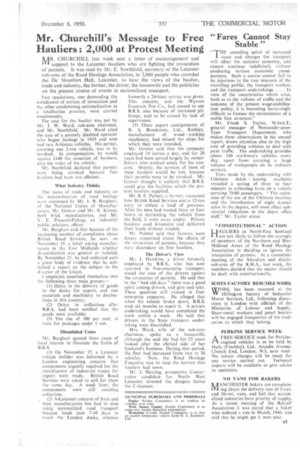Mr. Churchill's Message to Free Hauliers 2,000 at Protest Meeting
Page 37

If you've noticed an error in this article please click here to report it so we can fix it.
MR. CHURCHILL last week sent a letter of encouragement and support to the Leicester hauliers who are fighting the revocation of permits. It was read by Mr. E. Northfold, secretary of the Leicester sub-area of the Road Haulage Association, to 2,000 people who crowded the De Montfort Hall, Leicester, to hear the views of the haulier, trade and industry, the farmer, the driver, the housewife and the politician on the present course of events in nationalized transport..
Two resolutions, one demanding the withdrawal of notices of revocation and the other condemning nationalization as a totalitarian practice, were carried unanimously.
The case for the haulier was put by Mr. J. W. Ward, sub-area chairman, and Mr. Northfold. Mr. Ward cited the case of a severely disabled operator who began haulage in 1919 and now had two A-licence vehicles. His permit, covering one 2-ton vehicle, was to be revoked. In compensation, he would receive £140 for cessation of business.. plus the value of his vehicle. Mr. Northfold declared that permits were being revoked because free hettliers had been too efficient.
What Industry Thinks The views of trade and industry on the nationalizat:on of road haulage a ere expressed by Mr. J. B. Burghart, of the National Union of Manufacturers, Mr. Grover and Mr. R. Kirton. both brick manufacturers, and Mr. V. E. Prescott-Pickup, an industrial public relations officer.
Mr. Burgher' said that because of the increasing number of complaints about British Road Services, he sent. on November 15, a letter asking manufacturers in the East Midlands whether dissatisfaction was general or isolated. By November 21, he had collected such a great body of evidence that he submitted a report on the subject to • the director of the Union.
Complaints canalized themselves into the following three main groups:—
Ii) Delay in the delivery of goods to the docks for export, and raw materials and machinery to destinations in this country; (2) Delay in collection. after B.R.S. had been notified that the goods were available; (3) The rise of 100 per cent. in rates for packages under 1 ton..
Dissatisfied Users Mr. Burghart quoted three cases of local interest to illustrate the faults of B.R.S CI) On November 17, a Leicester vehicle builder was informed by a London engineering concern that components urgently required for the manufacture of industrial trucks for export were ready. British Road Services Were asked to call for them the same day. A week later, the components were still awaiting collection.
(2) AdLeicester concern of boot and shoe manufacturers has had to stop using nationalized road transport because loads took 7-10 days to reach the London docks, whereas formerly a 24-hour service was given. This concern, and the Wyvern Fountain Pen Co., had ceased to use B.R.S. also because of increased pilferage, said to be caused by lack of supervision. • (3) Three export consignments of R. S. Brookman, Ltd., Rothky, manufacturer of wood working machinery, had missed the ships for which they were intended.
Mr: Grover said that his company employed 70 lorries a day, and for 20 years had been served largely by ownerdrivers who worked solely for the concern. Shortly, the services of most of these hauliers would be lost, because their permits were to be revoked. Mr. Grover thought it unlikely that B.R.S. could give the facilities which the present hauliers supplied.
Mr. B. E. Palmer, a farmer, recounted how British Road Services sent a 12-ton lorry to collect a load of potatoes. After his men had wasted three or four hours in extricating the vehicle from the field, it went away empty. Private hauliers used 6-tonners and delivered their loads without trouble.
Mr. Palmer said that farmers were deeply concerned about the effects of the revocation of permits,because they were dependent on free hauliers.
The Driver's "View Mr. J. Hawkins. a driver formerly employed by B.R.S., who has now returned to free-enterprise transport, stated the case of the drivers against the revocation of permits. He said that irt the "bad old days" there was a good spirit among drivers, and give and take. These qualities still existed in freeenterprise concerns, He alleged that when his vehicle broke down, B.R.S. took six months to repair it. A private undertaking would have completed the work within a week. He said that drivers in the State • transport undertaking were dissatisfied.
Mrs. Ward, wife of the sub-area chairman, spoke as a housewife. although she said she had for 25 years looked after the cferical side of her husband's business. During that period. the fleet had increased from two to 36 vehicles. Now, the Road Haulage Executive was to reap the harvest that hauliers had sown.
Mr. J. Heyting, prospective Conservative candidate for North West Leicester, stressed the dangers facing the C-licensee.




























































































